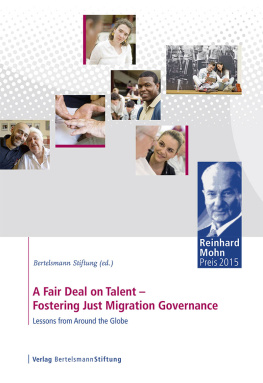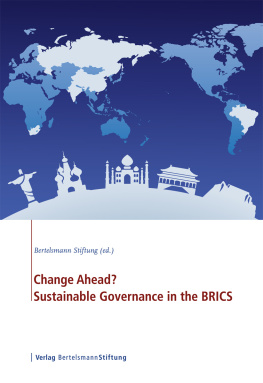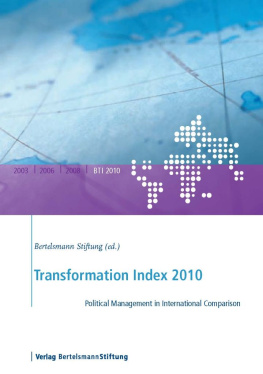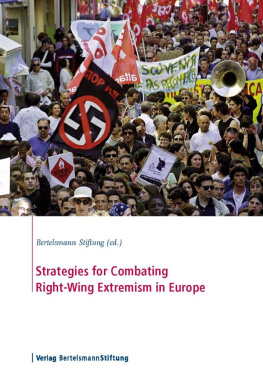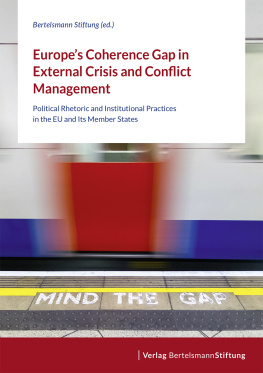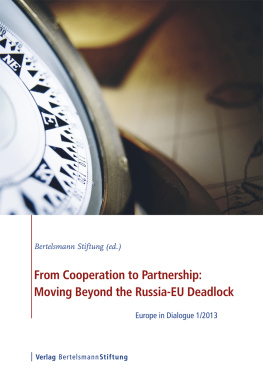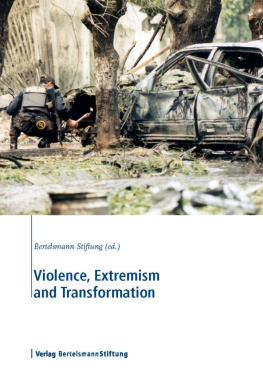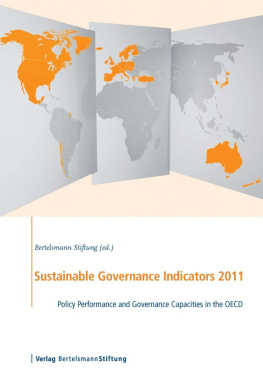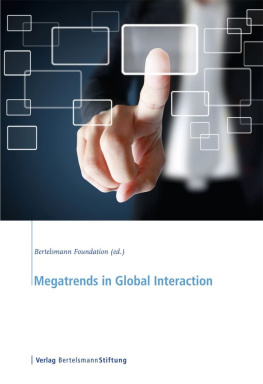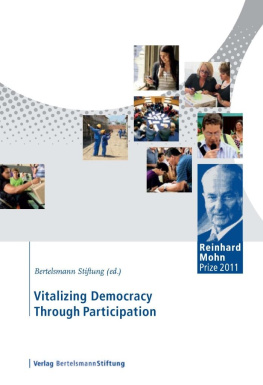Bertelsmann Stiftung - A Fair Deal on Talent: Fostering Just Migration Governance: Lessons From Around the Globe
Here you can read online Bertelsmann Stiftung - A Fair Deal on Talent: Fostering Just Migration Governance: Lessons From Around the Globe full text of the book (entire story) in english for free. Download pdf and epub, get meaning, cover and reviews about this ebook. year: 2015, publisher: Brookings Institution Press, genre: Politics. Description of the work, (preface) as well as reviews are available. Best literature library LitArk.com created for fans of good reading and offers a wide selection of genres:
Romance novel
Science fiction
Adventure
Detective
Science
History
Home and family
Prose
Art
Politics
Computer
Non-fiction
Religion
Business
Children
Humor
Choose a favorite category and find really read worthwhile books. Enjoy immersion in the world of imagination, feel the emotions of the characters or learn something new for yourself, make an fascinating discovery.
- Book:A Fair Deal on Talent: Fostering Just Migration Governance: Lessons From Around the Globe
- Author:
- Publisher:Brookings Institution Press
- Genre:
- Year:2015
- Rating:5 / 5
- Favourites:Add to favourites
- Your mark:
- 100
- 1
- 2
- 3
- 4
- 5
A Fair Deal on Talent: Fostering Just Migration Governance: Lessons From Around the Globe: summary, description and annotation
We offer to read an annotation, description, summary or preface (depends on what the author of the book "A Fair Deal on Talent: Fostering Just Migration Governance: Lessons From Around the Globe" wrote himself). If you haven't found the necessary information about the book — write in the comments, we will try to find it.
Bertelsmann Stiftung: author's other books
Who wrote A Fair Deal on Talent: Fostering Just Migration Governance: Lessons From Around the Globe? Find out the surname, the name of the author of the book and a list of all author's works by series.
A Fair Deal on Talent: Fostering Just Migration Governance: Lessons From Around the Globe — read online for free the complete book (whole text) full work
Below is the text of the book, divided by pages. System saving the place of the last page read, allows you to conveniently read the book "A Fair Deal on Talent: Fostering Just Migration Governance: Lessons From Around the Globe" online for free, without having to search again every time where you left off. Put a bookmark, and you can go to the page where you finished reading at any time.
Font size:
Interval:
Bookmark:
Bertelsmann Stiftung (ed.) A Fair Deal on Talent Fostering Just Migration Governance Lessons from Around the Globe Reinhard Mohn Prize 2015  Bibliographic information published by the Deutsche Nationalbibliothek The Deutsche Nationalbibliothek lists this publication in the Deutsche Nationalbibliografie; detailed bibliographic data is available on the Internet at http://dnb.d-nb.de . 2015 E-Book Edition 2015 Verlag Bertelsmann Stiftung, Gtersloh Responsible: Matthias M. Mayer Copy editor: Barbara Serfozo Production editor: Christiane Raffel Cover design: Nicole Meyerholz Cover photos: Veit Mette Typesetting and Printing: Hans Kock Buch- und Offsetdruck GmbH, Bielefeld ISBN 978-3-86793-659-0 (Print) ISBN 978-3-86793-690-3 (E-Book PDF) ISBN 978-3-86793-691-0 (E-Book EPUB) www.bertelsmann-stiftung.org/publications Contents Jrg Drger, Aart De Geus Jean-Pierre Garson Georges Lematre Andreas Heimer, Claudia Mnch Kate Hooper, Madeleine Sumption Khushwant Singh Bernd Parusel Espen Thorud Maria Nrby Triadafilos Triadafilopoulos Ramasamy Kone Pawe Kaczmarczyk Martina Lubyova Jad Chaaban Jonathan Crush Nilim Baruah Jean-Baptiste Meyer Florian Trauner Manjula M. Luthria, Casey Alexander Weston Lara White, Clara Pascual de Vargas Lotte Nordhus Grace Annan, Onyekachi Wambu Michael A. Clemens Gregory A. Maniatis Najim Azahaf, Ulrich Kober, Matthias M. Mayer Fostering a Triple Win through Fair Migration Governance If well managed, migration can generate mutual benefits for migrants, destination countries and origin countries. Well-managed migration involves benefits for migrants, as they improve their standard of living, expand their personal skill set and achieve upward social mobility. For destination countries, it can bring innovation, alleviate demographic pressures, generate fiscal benefits and foster cultural diversity. For origin countries, it can bring benefits associated with remittances, knowledge transfers, investments and the cultivation of business relations. In reality, however, migration-policy failures frequently lead to suboptimal or even negative outcomes. Migrants are often treated unfairly, unable to find employment commensurate with their qualifications or exploited by traffickers or corrupt employers. Poorly managed migration in destination countries can result in wage dumping and a neglected domestic labor force, both of which can subsequently foster social tensions and populist right-wing movements that feed on societal division. In origin countries, the external recruitment of workers may unnder certain conditions slow development opportunities and reduce the supply of skilled workers (brain drain). In 2013, approximately 232 million people worldwide lived in a country other than their native one. Realizing the full potential of migration involves nothing short of a paradigm shift toward the fair management of migration. This is the theme of the Bertelsmann Stiftungs Reinhard Mohn Prize 2015. Already in 2006, Kofi Annan, the former U.N. secretary-general and recipient of the Reinhard Mohn Prize 2013, demanded more fairness in migration policies, saying: More and more people understand that governments can cooperate to create triple wins for migrants, for their countries of origin and for the societies that receive them. We need to uphold this triple win as a normative principle for migration policies that are universally fair. Increasing migration rates around the world make this goal more urgent than ever. Development and urbanization pressures in developing societies are driving migration flows from these countries to many OECD countries currently facing dramatic demographic changes. According to U.N. estimates, by 2050, Europes working-age population will shrink by 96 million. At the same time, Africas working-age population will grow by 910 million and Asias by 517 million. Migration pressures on OECD countries in particular from African countries are therefore destined to grow. In parallel, international competition for labor will intensify. In the medium term, countries that have traditionally been the source of migration, such as China, will begin recruiting workers from abroad. Desired workers in this context include highly skilled professionals as well as persons with medium-level qualifications, particularly in the health care sector. A further challenge for migration policymaking is posed by increasing refugee flows resulting from political crises, for instance, in the Middle East and Africa. Whereas neighboring countries in particular must deal with a large influx of refugees, many European countries are struggling to deal with growing numbers of refugees. Similarly, there are increasing numbers of people seeking to escape massive poverty and economic insecurity worldwide. Implementing policies that can achieve a triple win is a challenging endeavor that gives rise to a number of questions. These include: Is the concept of a triple win merely a fancy European idea or a reflection of the way things do or should work? What are the respective roles of the market and the state in managing migration? To what extent can and should migration flows be controlled at all? How can we achieve both economic success and social cohesion? Can there be a social market economy for migration? What is the best system to manage migration in a fair way? The present volume addresses these questions by discussing different aspects of fair migration management, examples of good practices from around the world and possible ways forward. It has the following structure: Chapter I examines the main challenges and opportunities associated with fair migration. Chapter II presents a number of examples of good practices in fair migration management. Chapter III explores the perspectives of and approaches pursued by selected destination countries and regions of origin, as well as the role of international organizations and NGOs in fair migration management. Chapter IV examines how fairness in migration policy can be made fairer and provides policy recommendations for doing so. The Bertelsmann Stiftung would like to thank all of the authors for their excellent contributions. In particular, we would like to highlight the commitment of the OECDs International Migration Division, which co-organized, together with the Bertelsmann Stiftung, a workshop of international experts that laid the foundation for the present volume. As a complex phenomenon with many intertwined dimensions, migration requires a holistic approach. We hope that the ideas presented here will help find and develop answers to current migration and integration challenges and inspire policymakers to quote Kofi Annan again to create triple wins for migrants, for their countries of origin und for the societies that receive them.
|
Font size:
Interval:
Bookmark:
Similar books «A Fair Deal on Talent: Fostering Just Migration Governance: Lessons From Around the Globe»
Look at similar books to A Fair Deal on Talent: Fostering Just Migration Governance: Lessons From Around the Globe. We have selected literature similar in name and meaning in the hope of providing readers with more options to find new, interesting, not yet read works.
Discussion, reviews of the book A Fair Deal on Talent: Fostering Just Migration Governance: Lessons From Around the Globe and just readers' own opinions. Leave your comments, write what you think about the work, its meaning or the main characters. Specify what exactly you liked and what you didn't like, and why you think so.

